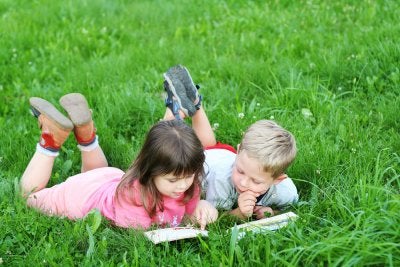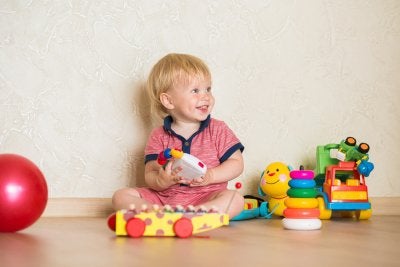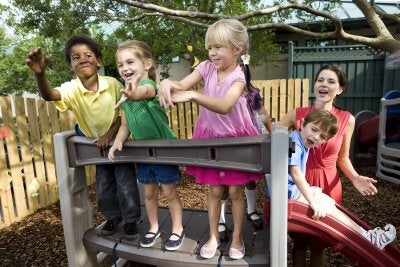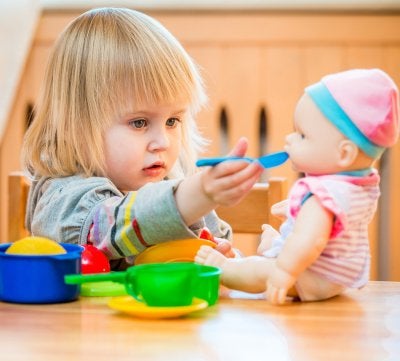-
Packing Snacks for Your Summer Camper
Summer camp is practically a rite of passage for kids. In Pembroke Pines, summer day camps feature lots of fun activities and opportunities for kids to make new friends. Unfortunately, it can be difficult for parents to get children to eat healthy foods while at summer camp. The trick is to make healthy snacks look fun to eat. You can see some demonstrations of this when you watch this interview with a registered dietitian.
She explains what she looks for in a healthy snack—primarily a combination of lean proteins and complex carbohydrates to give your child the energy needed for summer camp activities. For instance, you can add a little mustard to some low-sodium turkey slices, and wrap them around a thin, whole grain breadstick. Pack pepper strips and carrot sticks to dip into some low-sugar, plain or vanilla Greek yogurt. You could also stuff some granny smith apples, cinnamon, and low-fat ricotta cheese into a whole grain pita pocket.
-
Tips for Kindergarten Parents
Even if your child has attended structured early childhood education programs, the kindergarten year is an exciting milestone, as it’s considered the first year of formal schooling. Your child’s education in Pembroke Pines encompasses important academic skills like math and literacy, but it also involves personal growth and socio-emotional development. Encourage your child to reach for the stars, but have reasonable expectations and give your son or daughter the freedom to simply enjoy childhood.

Nurture your child’s independence.
When your son or daughter reaches kindergarten age, he or she will start displaying greater independence. Encourage this by teaching important self-care skills. Teach your child how to button up clothes, tie shoes, and wash hands. Position the milk jug and snacks on a lower shelf in the fridge, and let your child serve him-or herself. Spills are to be expected, as your child is still learning self-care skills.
Read every day.
Reading with your child every day is one of the most impactful ways to support your child’s education. It lets your son or daughter naturally absorb the rhythm and structure of sentences, and simply get absorbed in the magical world of stories. Reading with your child nurtures the close bond you share with him or her. It sparks your child’s imagination and entices his or her curiosity.
Create a musical home.
Every child has artistic tendencies, and nurturing them supports your child’s self-esteem and sense of wonder. Music also encourages a strong vocabulary, better memory, and dynamic social skills. Sing with your child in the car, or start a band in the kitchen by tapping on overturned pots and drinking glasses. Talent is not important, but enthusiasm is.
Talk often.
When your child was an infant, you probably learned that talking to him or her frequently supported healthy development. During the kindergarten age, this fact still holds true. Encourage your child’s oral language skills by actively listening to him or her, asking open-ended questions, and letting your child know that what he or she says is important to you.
-
Helping Your First Grader with Reading Skills
First grade is a pivotal year for literacy. Although struggling readers can always catch up, first graders generally establish themselves as competent or struggling readers during this year. You can support your child’s reading fluency and language comprehension by enrolling him or her in a high-quality first grade program in Pembroke Pines, but kids also need plenty of support at home. Talk to your child’s teacher about what you can do to support his or her success.

Writing Practice
First graders need lots of repetition and practice to get the hang of reading and writing fluently. Encourage your child put his or her new writing skills to use by asking for help with everyday tasks, like writing reminders on the calendar or adding items to the shopping list. Give your child a visually appealing journal to write in, and help him or her write short letters to grandparents or pen pals.
Word Games
Games are always an engaging way to entice kids to practice their literacy skills. Try Bananagrams, which involves word tiles contained within a “banana” pouch. Ask your child to write a story with you by taking turns adding one sentence to it. Start with a prompt, such as, “Jane was so excited when she woke up this morning because…” You could even create “mailboxes” for each family member. Fold a piece of construction paper in half, and staple the sides together to create a pocket that can be taped to a bedroom door. Household members can write silly notes to each other and “mail” them.
Critical Thinking Questions
Set aside some time each day to read with your child. Take turns reading from a favorite book and ask questions about the story that encourage critical thinking skills. Ask questions such as, “What do you think Jose will do next?” and “How do you think Gretchen felt when her friends did that?”
Screen Time
There are certainly some genuinely educational TV programs and computer games, but these are no substitute for a tangible book. Get your child off on the right foot by limiting screen time. Take your child to the library regularly for new materials he or she can explore during free play time. It never hurts to grab your own book to read silently as your child explores a new picture book or easy reader book.
-
Top Reasons Why Summer Day Camp Benefits Children
When summertime comes around, families are often faced with a dilemma about how to keep their little ones busy. Whether you work during the day or simply want your child to do something other than sit inside glued to an electronic device, day camp can be the best solution. In fact, summer day camps in Pembroke Pines offer a surprising array of benefits for kids. Here is a look at some of the rewards your child can reap by signing up for summer camp.

Summer day camp helps kids build social skills.
Summer day camp provides a unique social situation for kids. Often, going to day camp means meeting and bonding with other children that aren’t in their usual class. That means that they have to go out of their way to make and foster connections, learning the negative outcomes of choosing the wrong group of friends or ostracizing other campers. As day campers are making friends, they also must navigate the camp environment on their own and figure out how to get their needs met without being surrounded by familiar faces.
Summer day camp prevents brain drain.
If the last day of school is the first day your child starts forgetting everything he or she learns, the summer day camp could be the solution you’re looking for. Day camp doesn’t resemble school, but mixed in with all of the fun are lessons to help keep your child’s brain engaged and skills up. Your child won’t know that he or she is really learning, but you’ll see the benefits when the new school year begins.
Summer day camp keeps kids active.
If you’re constantly trying to push your child to get outside and play, let summer day camp help you make sure your child gets all that important activity into his or her day. You can count on fun outdoor activities being a central part of camp, which will help your child stay physically healthy and strong while encouraging good habits that can last a lifetime.
-
Choosing Educational Toys for Pre-K Kids
Toys can be a fun distraction for children, but they can also be educational and support their development. Is your child currently in pre-kindergarten in Pembroke Pines ? If so, then she is probably experimenting with her developing physical skills, asking many questions, and displaying a longer attention span. Continue reading for tips on selecting educational toys that can support your child’s education at this age.

Pick Toys That Allow Her to Create
Encouraging your child’s creativity is an excellent way to help her learn and develop. For this reason, you should look for toys that give your child something to create with. Some great examples of creative materials to offer your pre-k student are colored construction paper, crayons, markers, paintbrushes, finger paint, scissors made for children, scraps of cloth, paste, playdough, and chalk.
Choose Toys That Encourage Problem-Solving
At this age, you can support your child’s education and development by providing her with toys that demand problem-solving skills. Puzzles with 12 or more pieces and collections of objects that can be sorted in various ways, such as by color, size, quantity, and shape, are great educational toys for children in pre-k. You might offer her colored blocks, different sized bowls, and everyday items from around the house for these activities.
Select Picture Books That Are More Advanced
Now is the time to make the step up from the picture books that your child loved as a preschooler. As you peruse your options, choose books for your pre-k kid that have fewer pictures and more words than she is accustomed to.
Opt for Toys That Help Your Child Play Pretend
At this stage in her development, you can help your child by providing her with toys that encourage and help her to play pretend and stimulate her imagination. Consider giving your kid child-sized furniture, play food and appliances, dolls or stuffed animals to accessorize, dress-up clothes, puppets, construction sets, and blocks for building structures.
-
The Importance of After School Activities
Participating in a variety of activities offers kids several benefits. If you’re thinking about enrolling your child in an after school program near Pembroke Pines, then continue reading to learn about the importance of these activities for children.

Developing New Interests
As your child continues to grow and develop, you may notice that she is embracing new hobbies and likes. When you enroll your child in after school programs, this gives her a chance to pursue sports and activities that interest her. At the same time, giving your child the opportunity to begin a program of her choice allows her to try something new and develop a diverse set of interests. Whether it’s soccer, drama club, or band, enrolling your child in programs like these can give her a chance to discover a passion that she can continue to pursue in the future if she desires.
Building Self-Esteem
While her academic classes can encourage teamwork, socialization, and confidence, after school programs can often do this to a greater extent and in a more relaxed setting. If your child tends to be shy, then enrolling her in after school activities may provide her with the outlet that she needs to interact more with others and build her self-esteem.
Improving Academic Performance
While you may not associate sports and other programs with your child’s grades, recent studies have identified a correlation between better academic performance and the work and behavior habits that develop because of participation in after school programs.
Strengthening College Applications
If your child is still young, then you may not be thinking as far ahead as college. However, no matter her age, fostering interests and passions now is a great way to help ensure that she continues to participate in activities through high school. No matter the type of after school programs that she ends up pursuing, being able to add these to her college application is an excellent way to improve her chances of acceptance.
-
How to Help Your Preschooler Overcome Separation Anxiety
It can be difficult for a parent to see a child have difficulty coping with departures, but separation anxiety is a normal part of childhood development. Ironically, some childhood development experts believe that separation anxiety is actually an indicator of the newly discovered independence of a child because he or she is attempting to exert control over the situation. When it’s time for your preschool student to say goodbye at the learning center in Pembroke Pines, there are some strategies you can use to ease the transition. In time, your child will start to look forward to arriving at the early learning center .
Develop a Consistent Routine
Children thrive on consistency. When your child is ready to enter preschool, you might ask him or her to help you create a secret handshake or another special goodbye ritual. Some parents use a special phrase for the departure that reminds their children that they’ll be back to pick them up. For instance, you could say, “See you later, alligator”. Use this routine each morning to help your child feel more secure. Picking your child up at the same time every day may also help him or her feel better.
 Select a Comfort Item
Select a Comfort Item Call the early childhood education center ahead of time to inquire about its policy on personal possessions. Then, ask your child to help you select a comfort item that he or she can take to preschool. Remember to label the item clearly with your child’s name.
Avoid Prolonging Your Departure
It’s never a good idea to try to sneak away without saying goodbye. However, you should also avoid long goodbyes. When it’s time to leave, do your departure ritual with your child, remind him or her that you’ll be back soon, and then leave promptly.
Use Pretend Play
If it seems to take a while for your child to adjust to saying goodbye, pretend play may help. At home, have your child select a couple of dolls or stuffed animals. Designate one doll as the mother or father and the other as the child. Then, you and your child can use the dolls to act out the scenarios of leaving the child at preschool and going back for him or her at the end of the school day.
RECENT POSTS
categories
- Uncategorized
- Early Learning Center
- Pre-K
- Children
- Child Care Center
- Preschooler
- Preschool Blog Category | Tanglewood Academy
- Preschool Lunch
- Tanglewood Academy
- After-School Program
- Toddler School
- Early Childhood Education
- preschool activities
- pre-kindergarten
- childhood education
- pre-kindergarten programs
- Children’s education
- enrichment opportunities
- Kindergarten
- Nurturing Education Environment
- Toddler Care
- Child Separation Anxiety
- Toddlers
- Summer camp
- summer activities
- VPK
- Voluntary Pre-K
- Outdoor Activities
- Smart Strategies
- Tie Shoes
- Snacks
- Physical Activities
- Education
- Enrichment Activities for Kids
- Early Education Activities
- Preschool Curriculum
- Classroom Learning
- APPLE accreditation
- Language Comprehension
